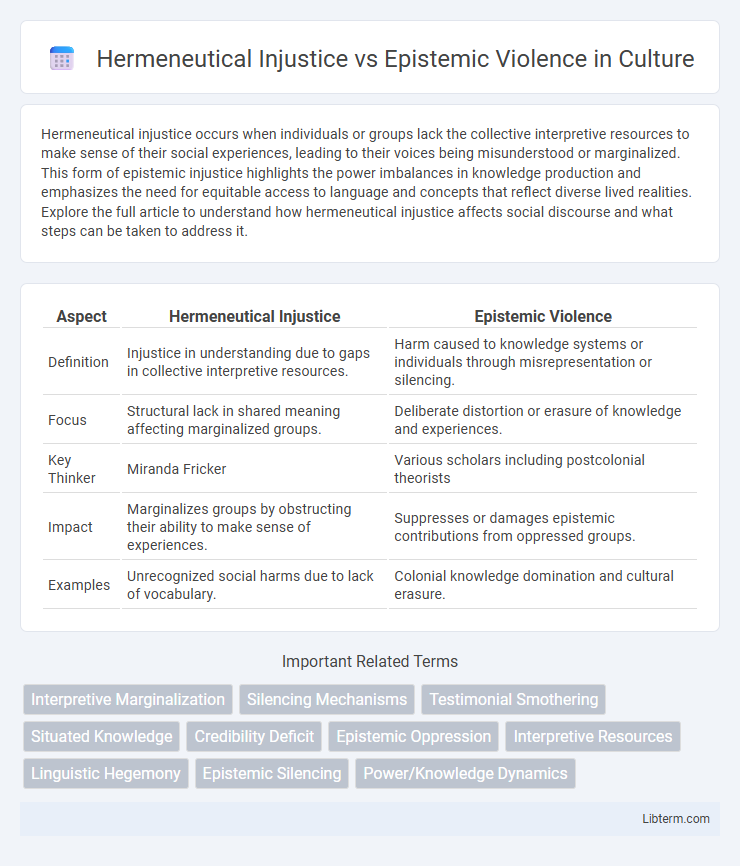Hermeneutical injustice occurs when individuals or groups lack the collective interpretive resources to make sense of their social experiences, leading to their voices being misunderstood or marginalized. This form of epistemic injustice highlights the power imbalances in knowledge production and emphasizes the need for equitable access to language and concepts that reflect diverse lived realities. Explore the full article to understand how hermeneutical injustice affects social discourse and what steps can be taken to address it.
Table of Comparison
| Aspect | Hermeneutical Injustice | Epistemic Violence |
|---|---|---|
| Definition | Injustice in understanding due to gaps in collective interpretive resources. | Harm caused to knowledge systems or individuals through misrepresentation or silencing. |
| Focus | Structural lack in shared meaning affecting marginalized groups. | Deliberate distortion or erasure of knowledge and experiences. |
| Key Thinker | Miranda Fricker | Various scholars including postcolonial theorists |
| Impact | Marginalizes groups by obstructing their ability to make sense of experiences. | Suppresses or damages epistemic contributions from oppressed groups. |
| Examples | Unrecognized social harms due to lack of vocabulary. | Colonial knowledge domination and cultural erasure. |
Defining Hermeneutical Injustice
Hermeneutical injustice occurs when marginalized groups lack the collective interpretive resources to make sense of their social experiences, resulting in their voices being misunderstood or ignored. This form of injustice undermines their ability to communicate knowledge about their oppression, as dominant epistemic frameworks exclude or distort their perspectives. Unlike epistemic violence, which encompasses broader harms to knowledge production, hermeneutical injustice specifically addresses the gaps in societal understanding that silence marginalized experiences.
Understanding Epistemic Violence
Epistemic violence occurs when marginalized groups are systematically discredited or silenced, leading to a distortion or erasure of their knowledge and experiences. This form of injustice undermines the epistemic agency of individuals by invalidating their ways of knowing, thereby perpetuating social inequalities. Understanding epistemic violence is crucial for addressing deeper systemic barriers within knowledge production and fostering more inclusive epistemic practices.
Historical Origins of Hermeneutical Injustice
Hermeneutical injustice originates from systemic gaps in collective interpretive resources, often rooted in historical power imbalances that marginalize certain groups' experiences and knowledge. Unlike epistemic violence, which involves direct suppression or distortion of knowledge, hermeneutical injustice emerges when marginalized individuals lack the frameworks necessary to make sense of their social realities. This concept traces back to feminist philosophy and critical theory, highlighting the lasting impact of social hierarchies on knowledge production throughout history.
Tracing the Roots of Epistemic Violence
Tracing the roots of epistemic violence reveals its emergence from systemic inequalities in knowledge production and dissemination that marginalize certain groups' experiences and perspectives. Hermeneutical injustice specifically refers to the gap in collective interpretive resources that prevents marginalized individuals from making sense of their social experiences, directly contributing to epistemic violence. Understanding this linkage highlights how structural power imbalances perpetuate both hermeneutical injustice and broader epistemic harm through exclusion and misrepresentation.
Mechanisms of Marginalization: A Comparative View
Hermeneutical injustice occurs when marginalized groups lack the collective interpretive resources to make sense of their social experiences, resulting in systematic gaps in understanding. Epistemic violence involves the active silencing or distortion of marginalized voices through dominant knowledge systems that delegitimize alternative epistemologies. Both mechanisms perpetuate marginalization by undermining epistemic agency and sustaining power imbalances in knowledge production and communication.
Case Studies: Real-World Examples
Hermeneutical injustice occurs when marginalized groups lack the interpretive resources to make sense of their experiences, exemplified by the failure to recognize domestic violence victims' testimonies in legal systems. Epistemic violence manifests through the systematic silencing and misrepresentation of these groups, as seen in indigenous communities' knowledge being dismissed in environmental policy-making. Case studies such as rape survivors' struggles for credibility and the erasure of LGBTQ+ narratives in healthcare highlight the tangible impacts of these intersecting injustices.
Intersections and Divergences between the Concepts
Hermeneutical injustice arises when marginalized groups lack the interpretive resources to make sense of their social experiences, while epistemic violence refers to the broader harm inflicted through knowledge production and dissemination that silences or distorts marginalized voices. Both concepts intersect in highlighting the power dynamics embedded in knowledge systems that perpetuate inequality and exclusion. Divergences lie in their scope: hermeneutical injustice specifically addresses gaps in collective understanding and interpretive frameworks, whereas epistemic violence encompasses various forms of knowledge-based harm, including testimonial injustice and representational distortions.
Impact on Social and Political Structures
Hermeneutical injustice undermines marginalized groups by restricting their ability to articulate social experiences, leading to systemic misrepresentation and exclusion in political discourse. Epistemic violence enforces dominant knowledge frameworks, marginalizing alternative perspectives and reinforcing power hierarchies within social institutions. These phenomena collectively perpetuate inequality by shaping policies and social norms that silence subordinated voices and limit equitable participation in governance.
Addressing and Mitigating Injustice and Violence
Addressing hermeneutical injustice requires enhancing marginalized groups' interpretive resources to ensure their experiences are understood and validated within dominant discourses. Mitigating epistemic violence involves critically examining knowledge production systems to prevent the silencing, misrepresentation, or exploitation of oppressed communities. Implementing inclusive epistemic practices and fostering collaborative dialogue can reduce both forms of injustice and promote equitable knowledge-sharing.
Future Directions in Epistemic Justice Research
Future directions in epistemic justice research emphasize integrating interdisciplinary approaches to address hermeneutical injustice and epistemic violence comprehensively. Advancements in social epistemology advocate for developing inclusive frameworks that dismantle structural biases obstructing marginalized groups' knowledge contributions. Emerging methodologies prioritize collaborative knowledge production and resistance to epistemic oppression, fostering equitable epistemic environments.
Hermeneutical Injustice Infographic

 libterm.com
libterm.com